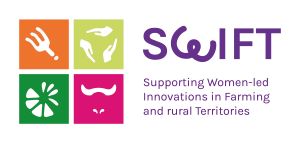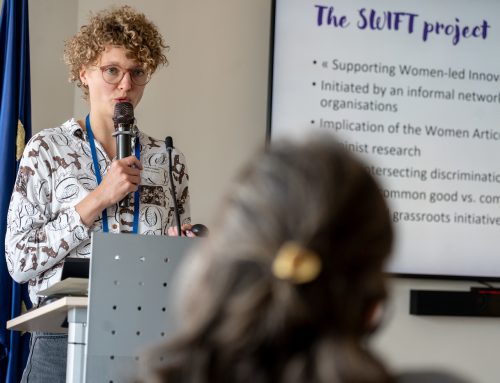In March 2023, four representatives of Rural Sociology Group attended the SWIFT project’s kick-off meeting. Here SWIFT researcher Georgia Diamanti shares some of her experiences and reflections.
Agriculture is masculine: only 30% of all agriculture in Europe is practiced by women and, when you go higher up, at the relevant policy decision-making boards, women are almost absent. It is against this context that SWIFT is operating.
At the time of the project meeting, I had just been working at Wageningen University and on this project for a little over a month but was quite excited at the prospect of getting to join the rest of the project members in Spain for our kickoff meeting. The organizations and institutions that were part of SWIFT were spread across Europe and as such we mostly only knew each other over Zoom meetings.
We arrived on Sunday evening, following a scenic drive through the Spanish mountainside – just as the sunset’s final colors filtered through the trees. The house we were to spend the coming week, “Riera d’Agres”, was a beautifully restored property that used to function, as we later found out, as a children’s farm camp. Here, children were taught agroecological principles and a consciousness of the work that goes into getting food on a plate. It felt like a very fitting venue for the occasion. Slowly, we gathered in the dining hall.
SWIFT participants rest and connecyt outside Riera d’Agres
As we sat for our first dinner, persons who we had thus far known only as faces on our screens began one by one to materialize. After handshakes and warm hugs were exchanged, people seemed to enter into lively conversations. It was clear how we were all connected by common interests and values. It made coexistence feel comfortable and natural, almost from the very start. Amidst the excitement to have made it and to find ourselves in such a beautiful place after a long journey (that had preceded for the majority of us) there was also a detectable feeling of uncertainty, about what was to come in these 5 days we were set to spend in Agres. Not much later, satiated by the tasty food that was served to us by our hosts, we retired to our rooms for the night, excited for the week to begin.
To give some context to the week, it was to be split into two parts overall; Monday and Tuesday were for the SWIFT group to get introduced, and to brainstorm about project expectations, concerns, etc., while Wednesday to Friday was to be focused on bringing in the experiences of the WLIs. For this part, women (and one non-binary) farmers were invited to join in our activities, while also being given the space to share their experiences and desires for the project.
The very logic behind SWIFT was for it to grow in a more organic, bottom-up approach – one that incorporated the experiences of those affected by the policies within the process itself. To make the producers from research object to research subject. Here, we were even joined by three women who had come all the way from Brazil who worked with various feminist and agro-ecological organizations, and Maggie who operated an LGBTQI+ farm in New York. While not directly under the scope of SWIFT (which focuses on the EU) their purpose was to share and inspire – something which they most definitely did.
The latter part of the week was the more emotional one. Seeing the women speak about their experiences and the emotion with which they articulated their troubles, concerns, and hopes resonated visibly with the rest of the group. I recall briefly scanning the room while one of the producers was speaking, only to find tears gleaming in many of the attentive faces as we listened together. It was nice to see that not only had the space we’d created allowed so many of us to be open and vulnerable but also that this process was growing as intended, in collaboration with those whose lives the research concerns.
During the final days, we spoke also of concrete ways in which to help achieve the goals of SWIFT – here I refer not only to our strict deliverables to the EU but also further ways through which the project could truly be of assistance to the Women Led initiatives (WLIs) and their daily struggles. We talked a lot about the possibility (and responsibility) of research as a form of activism. And so, although it’s true that SWIFT had a lot of policy-related deliverables, we also spoke of how we could, in parallel work to change the general narrative; speaking even of facilitating a feminist school or a documentary (ideas that seemed to receive high support from the majority).
If anything, even the academic literature itself continuously points out cultural norms and normative expectations as barriers to women being able to realize their full potential, particularly in the developed world where strict legal barriers to land ownership are not present as they are in developing countries but where barriers nevertheless persist. As such, while collaborating with EU institutions is important, other soft-power strategies may be worth investing in.





Leave A Comment